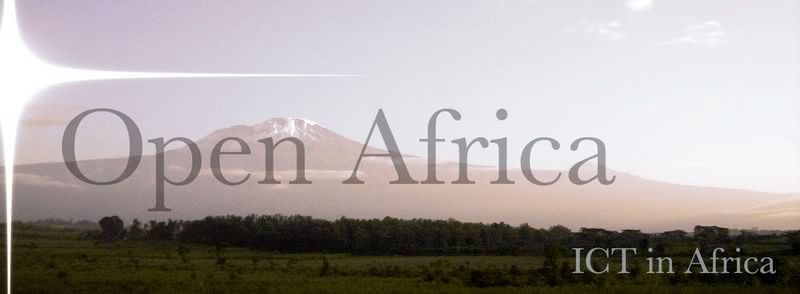
Archive
• March 2006• April 2006
• July 2006
• August 2006
• December 2006
• January 2007
• March 2007
• April 2007
Wednesday, August 09, 2006
ICT people always want the latest and the most expensive tools. There is not difference between the ICT professionals in Europe and Africa. This is however, not necessary the best solution and in Africa this behavior often leads to so-called white elephants (projects that are abandoned since no one knows how to operate them). Last week I did an ICT-project evaluation of a project in Malawi. The project delivers medical content to rural health centers through Worldspace Radio Data Casting (www.worldspace.com). This technology is described at the website as follows:"Datacasting involves one-to-many (or multicast) dissemination of data. The data itself could be files (of any format) including web pages. Data to be uplinked to a WorldSpace satellite is first aggregated at the WorldSpace studio or is presented in a suitable format by the content contributor to the uplink site or Hub. Subsequently, an advanced scheduling mechanism at the Hub schedules the content for distribution via a WorldSpace satellite. Datacasting is the preferred way of disseminating information amongst closed user groups."Many of my ICT colleagues would immediately say that this is inferior technology. It is one-way, it is slow, it needs through a special facility and when you see the system in operation, you see that it has a lousy interface. There is no search facility, you cannot store the information. In other words, internet but then 15 years ago. Not interesting for the majority of the ICT-people. Does this make it useless technology? No, not at all. The project in Malawi shows how this technology can be made relevant and useful.
The health care sector in Malawi is divided in Central Hospitals (4), District Hospitals, Rural Hospitals (30+) and Rural Health Centers (200+). Most of the medical staff in these facilities are trained up to diploma level (clinicians, nurses, medical assistants etc). Doctors are hardly there, since they are only trained in Malawi since 1991 and most of the medical students leave the country as soon as they get their degree to look for greener pastures (the famous African Brain Drain).
The hospitals get reasonable support from the government and donor organizations, but the pain is in the Rural Health Centers. This is the entry point for most people in the health system, at the same time the staff is poorly trained and ill-informed about the news and important health innovations. On top of that the rural centers operate on an absolute minimal budget. Access to internet is not an option for these centers. They do not have the financial means for that, and also they are often not in the proximity of an access point (telephone or other). At present, can hardly get information out to them and we just hope for the best.
With the Worldspace technology and some old computers we can connect the centers to the world-wide information grid. At a very low cost we can supply them of information on the health issues in the country and even internationally. We can educate them in health innovations by sending them short refresher courses etc. Old technology, obsolete hardware and lousy software that can revolutionize the health sector in Africa. Appropriate technology in action. Where most of my colleagues technology that is not hip, they can make terrible mistakes. They perceive the problems and needs of the users through the their own needs and preferences. The resulting solutions are out-of-context and not sustainable.
The health care sector in Malawi is divided in Central Hospitals (4), District Hospitals, Rural Hospitals (30+) and Rural Health Centers (200+). Most of the medical staff in these facilities are trained up to diploma level (clinicians, nurses, medical assistants etc). Doctors are hardly there, since they are only trained in Malawi since 1991 and most of the medical students leave the country as soon as they get their degree to look for greener pastures (the famous African Brain Drain).
The hospitals get reasonable support from the government and donor organizations, but the pain is in the Rural Health Centers. This is the entry point for most people in the health system, at the same time the staff is poorly trained and ill-informed about the news and important health innovations. On top of that the rural centers operate on an absolute minimal budget. Access to internet is not an option for these centers. They do not have the financial means for that, and also they are often not in the proximity of an access point (telephone or other). At present, can hardly get information out to them and we just hope for the best.
With the Worldspace technology and some old computers we can connect the centers to the world-wide information grid. At a very low cost we can supply them of information on the health issues in the country and even internationally. We can educate them in health innovations by sending them short refresher courses etc. Old technology, obsolete hardware and lousy software that can revolutionize the health sector in Africa. Appropriate technology in action. Where most of my colleagues technology that is not hip, they can make terrible mistakes. They perceive the problems and needs of the users through the their own needs and preferences. The resulting solutions are out-of-context and not sustainable.
Previous Posts
• Review of Telco sector in SA• Understanding the East African Submarine Cable pro...
• Als het voor ons goed is, waarom gebruiken jullie ...
• Mobile Banking - An African Practisioners Perspective
• ICT for SME's in Africa
• Covergence and Regulation in West and Central Africa
• The secret of AfrISPA
• Appropriate Technology in Action
• And Now Back to Civilization
• Relapse - 1
Associated with
• East African Center for Open Source Software• World Dialogue on Regulation
• Global Text Project
• Livre
Free Software

The template is generated via PsycHo.